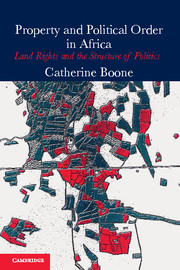Book contents
- Frontmatter
- Dedication
- Contents
- List of Figures, Tables and Maps
- Preface and Acknowledgments
- 1 Introduction
- Part I Property Rights and the Structure of Politics
- Part II
- Part III
- Part IV
- Multiparty Competition
- 9 Winning and Losing Politically Allocated Land Rights
- 10 Zimbabwe in Comparative Perspective
- 11 Conclusion
- Appendix Land Politics Cases and Sources
- References
- Index
11 - Conclusion
Property Institutions in Political Explanation
Published online by Cambridge University Press: 05 June 2014
- Frontmatter
- Dedication
- Contents
- List of Figures, Tables and Maps
- Preface and Acknowledgments
- 1 Introduction
- Part I Property Rights and the Structure of Politics
- Part II
- Part III
- Part IV
- Multiparty Competition
- 9 Winning and Losing Politically Allocated Land Rights
- 10 Zimbabwe in Comparative Perspective
- 11 Conclusion
- Appendix Land Politics Cases and Sources
- References
- Index
Summary
This book has made four arguments about property institutions in rural Africa. First, they are created, enforced, and manipulated by states (both colonial and contemporary). Second, they are largely authority based rather than market based, and thus differ fundamentally from liberal forms of property. Third, they vary across space, providing the main analytic leverage point that we exploit in this analysis. And fourth, they have political effects – not only on forms of land-related conflict, but also on ethnicity and ethnic politics, the scale and scope of political competition within national territories, the politicization of local resource struggles, and electoral dynamics. This conclusion draws out ramifications of these arguments for comparative politics and African politics.
PROPERTY REGIMES AND COMPARATIVE POLITICS
Secure, credible private-property regimes are absent in many parts of the world. The field of comparative politics has yet to exploit the full implications of this fact. The “transitions to democracy” literature focused intently on the political effects of political institutions such as formal regime type and electoral rules, yet often ignored what classical political economy regarded as the institutional core of all economies: the property regimes. Transitions studies were built on the general belief that economic and political liberalization go hand in hand, and would work together to depoliticize property relations. Structural adjustment in the developing world and the fall of communism were believed to have liberated productive assets from political controls, weakening rulers and empowering individuals in society.
- Type
- Chapter
- Information
- Property and Political Order in AfricaLand Rights and the Structure of Politics, pp. 309 - 332Publisher: Cambridge University PressPrint publication year: 2014

